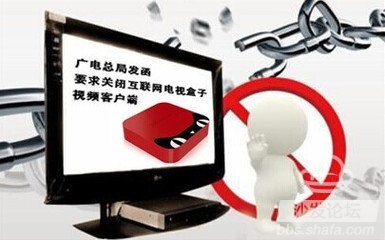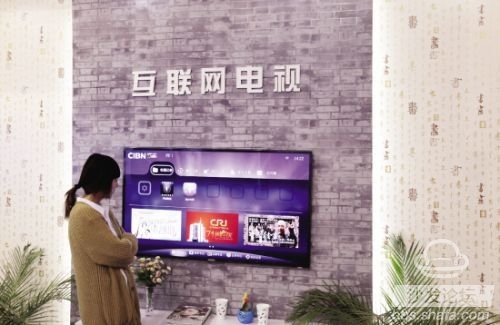
For many TV boxes and companies in the smart TV industry, Document 181 is like a shadow floating on the head. It means that the vitality of previous years, but the wild and unorderly growth has to turn into the system The track is over. As one of the most controversial documents issued by the General Administration of Radio, Film and Television in recent years, the ordinance has so far run through three years. It has been rumored recently that the SARFT has further reaffirmed the relevant provisions of the document. This has caused several companies in the industry to rejoice, and whether the policy will have a major impact on the company? Where will the next step of Internet TV go?
Regulatory tightening
A few days ago, the media broke out. The General Administration of Radio, Film and Television issued an emergency notice to seven licensees, requiring all Internet-related TV companies to conduct self-correction, self-examination and rectification of violations. It is understood that the above violations mainly refer to the following four points: In models released after the beginning of 2015, the USB port can still be used to install applications; in the system, there are still browsers that can access the Internet; through the application store or Other means to push the situation of aggregating application software, video website client, and radio application software; through the application store or other means, pushing a remote control application that can remotely play video through a mobile phone.
This news came out like a deepwater bomb dropped on the TV box and smart TV market. The industry believes that the new round of rectification may begin.
However, the China Business News reporter called the relevant companies, such as the Internet TV licenses and the number of Knowlton (now renamed the Oriental Pearl), both said they have not received relevant notices, and Internet TV maker LeTV also said that the relevant agencies did not notify the launch of self-examination activities. However, Bao Wei, the head of the digital culture working group of Yi Weiwei’s cultural communication CEO and the Ministry of Industry and Information Technology’s Interactive Media Industry Alliance, confirmed to the reporter that there is indeed this document.
The authenticity of the message is confusing. However, the seemingly ethereal market sentiment is often foreshadowed.
Oriental Pearl Vice President and Executive Secretary Xu Feng told reporters that he learned from relevant information channels and sources that the General Administration of China does issue related notices, but specific documents should still be drafted. He believes that as for the rectification incident, because the above four points are all from the previously issued Document 181, they are more inclined to reiterate and more severe warnings.
In 2011, when the Internet TV industry was just emerging, the State Administration of Radio, Film and Television released Document 181. According to the provisions of the document, the content provided by television boxes, smart TVs, and other products must be provided by CNTV, Huadian, Shanghai Wenguang (Oriental Pearl), Southern Media, Hunan Television, China Radio International, and Central People's Radio. It is presented on the integrated broadcast control platform of licensees and is subject to the supervision of the aforementioned agencies. At the same time, Internet TV products must not have other access to the Internet.
Xu Feng believes that the relevant regulations are again emphasized at this time. This is a further continuation of the SARFT's initiative to release Internet and other information networks for the dissemination of audiovisual programs (revised draft) in mid-June this year. "The media not only has industrial functions, but also ideological communication-oriented functions. As ideological management, the regulatory trend of policies will certainly continue to be strengthened. The consistent supervisory logic of SARFT is that Internet TV as the broadcast platform for emerging media must be state-owned. The State Administration of Radio, Film and Television came to control, and the object of this rectification was illegal Internet TV participants, especially for companies suspected of having rental licenses, "especially.
According to him, although according to the regulations of SARFT, all content of Internet TV needs to be docked with 7 licensees, and the interface of the product needs to use the UI interface of the licensee, to ensure that state-owned licensees can quickly ban the content when content violates the regulations. , But there are the following violations: First, some manufacturers want to do Internet TV broadcast control platform, but there is no content license. Second, some manufacturers and licensees set up joint ventures, hoping to "acquire" their licenses, but in fact they do not really have access to the platform of the licensees, and the product interface is its own. Thirdly, the broadcast control interface is used in name. However, the content actually played is controlled by oneself and the licensee cannot control it. "Now everyone wants to be an Internet TV platform. Some manufacturers are nominally connected to the license plate. They actually control the platform themselves and allow the licensees to become content providers, but it itself becomes a platform. But some licensees The licensing fee is still willing to provide such services, and the manufacturers have paid a toll in disguise. According to Document 181, this is inadmissible to SARFT."

If there is a largest revenue player in Document 181, there is no doubt that it is a state-owned licensee company. Wu Chunyong, a radio and television industry expert, believes that Document No. 181 has made content-focused broadcast control platforms a key hub and a bridge for the Internet television industry, strengthening its dominant position in the industry. Before the publication of this document, manufacturers on the market walked around the licensees, and some companies illegally developed content broadcast control platforms, manufactured set-top boxes, and sold them to consumers.
However, in spite of this, the true attitude of the regulatory licensee is rather "not overshadowed." Some industry insiders told reporters: "Licensing companies on the one hand hope that the General Administration of Administration, because the special market position given by the regulations can provide them with living space. But on the other hand, if the management is too strict, everyone will take the path of the cottage. Or exit the industry, after all, this industry is not big. Therefore, on the one hand, the licensees firmly support the General Administration of Directorate, on the other hand, they also "drain the water" because they do not put their own, do not put home, hardware manufacturers to find someone to cooperate. "
The above-mentioned sources believe that compared with private Internet companies, state-owned licensee companies are even more difficult to manage. "Different from private enterprises, enterprises in the system have corresponding powers, and the power and power are equal to each other. Therefore, many things are silent afterwards. There are many kinds of things in the broadcasting and TV industry."
In fact, because of the above reasons, the document No. 181 has been issued for more than three years so far and it appears to be “tepid†in implementation. In a reaffirmation made by the General Administration of Radio, Film and Television in 2014, it truly showed an “iron hand†means. . Affected by the rectification of the year, Internet companies such as Xiaomi and Leshi suffered a "free growth" and self-built platform outside the system and the innovation model suffered a loss. Since then, it has gradually turned to the cooperation with the licensee. Taking music as an example, the company is currently working with China International Radio to rectify Internet TV terminals.
Some people are concerned that the Internet TV industry has just begun. However, it is difficult for content to develop rapidly. The significance of long-term smart TVs will degenerate into screens, and audiences will return to video websites with richer content, lacking the demand and motivation to promote the development of Internet TV. .
"It's definitely not a good thing to stand at the user's point of view. Many applications are banned. For companies like Xiaomi and LeTV, the speed of their innovation may be delayed. Currently, many Internet companies have developed screen casting artifacts and TV assistants. In accordance with the regulations, all are illegal, but from a normative point of view, the functional management departments need to regulate the market and the industry, and use policies to evade possible risks. This is a trade-off issue,†Wu Chunyong told reporters.
The opinions of the internal companies of the broadcasting and TV department are also different. "Internet TV is a special industry, and our country has special regulatory considerations for the supervision of the media industry. Athletes should follow the rules and should not first commit fouls, and only if they do not foul, they can be confident that policies and rules have problems. If not, Policies and rules also lose their authority." Xu Feng said.

The road ahead is difficult?
Policy No. 181 makes the future of TV boxes and Internet TV seem uncertain. In addition to innovative internet companies, there are also many nerves of traditional home appliance companies. In recent years, the profits of home appliance manufacturing industry have become increasingly thin. In particular, traditional TV manufacturers have turned their attention to the popularity of smart TVs and hope to rely on smart television value-added services in the future to gain new profit prospects. Increasingly stringent regulations seem to have thrown cold water on home appliance companies. However, the industry believes that the situation may not be so pessimistic.
"Actually, the space for TV boxes and smart TVs is still quite large. From the point of view of user application habits, users are currently watching video programs rather than other applications. This rectification restricts video aggregation applications, such as The user originally could not watch overseas stations, but now it is possible to install a box, which is not allowed, but this part of the demand is still small in the actual viewing of Chinese users. The vast majority of the population still look at domestically produced TV dramas. Most of the users watched domestic TV shows, not banned by the Directorate-General. This part of the content is now oversupply, so there is still room for it, "said Bao Bao, in an interview.
Some companies are also relatively optimistic. In the letter to reporters, LeTV stated that “The monitoring of the Internet sector is mainly aimed at clearing out irregular operators. The short-term fluctuations in the market are unavoidable. It is a long-term good for the regulatory companies. For LeTV, specifically, the content payment model will not Change, but the link will involve the cooperation of the licensee. The supervision will crack down on aggregate search and piracy. LeTV's copyrighted content will gain more benefits. From the platform point of view, it will continue to cooperate with license partners and other parties. From the perspective of compliance with the law, it is possible to continue sales and the application layer will not be affected."
This content is copyrighted exclusively by SofaNet. Welcome manufacturers to further exchanges and cooperation with us to create more in-depth product reports.

Smart TV box recommended to install sofa butler, download address: http://app.shafa.com/
Sofa Net is an Internet technology company specializing in smart TVs and boxes. It owns popular products such as sofa butlers, sofa tables, and sofa forums. It has been committed to providing high quality application resources for smart TV and TV box users and active community exchanges. And authoritative evaluation of smart TV products.
Second, lithium is much lighter than other metals used in batteries, such as lead, which is important for small objects such as phones but also for cars that require many batteries. Third, lithium-ion batteries are rechargeable, because lithium ions and electrons move easily back into negative electrodes.
The new Streamlight Stinger 2020 Flashlight is powered by its SL-B26 Battery Pack to ensure a powerful performance. The two packs are protected lithium ion batteries with a 2600mAh capacity, on-board safety control circuits, and built-in USB charging ports. These batteries can be recharged up to 500 times, saving you time and money.
Power your world with GLIDA Battery Products- Lithium Ion Battery. ... The latest trend in lithium battery used in consumer electronic products and IT gadgets. It is flexible in footprint and ... $0.00. 3.7V 6000mAh 18650 (1S2P) Li-ion Battery Pack.
Lithium Ion Battery,Battery Lithium Ion,Li Ion Battery,Rechargeable Li-Ion Battery
Shenzhen Glida Electronics Co., Ltd. , https://www.szglida.com